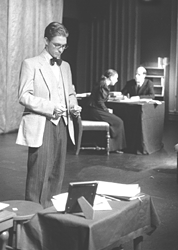

When you've finished reading this review, you could critique it as dangerously hierarchical, not reflecting class interest and a betrayal of the social responsibilities of art, and then you'd be a bit like Lenin. Or you could slip in an allusion to it in your forthcoming novel based on mythology, and then fancy yourself James Joyce. Or you could cut out all the words, pick them out of a hat one by one, and have a poem, and then you'd be almost exactly like Tristan Tzara, founder of Dadaism, except that he thought of it first. These three artistic/historical figures form the center of Tom Stoppard's Travesties, a sprawling, slightly surrealist play about art and politics, rife with Stoppard's cerebral humor.
The play opens in Zurich in 1917, with the three men plying their respective trades in a split-scene that sets up the conflict of meanings inherent within the play. Joyce (senior Greg Pierce) recites limericks, Lenin (first-year Ben Stuber) and his wife (senior Eve Udesky) converse in Russian, and Tzara (sophomore Roger Barker) makes a poem from a polyglot of pieces. The next half hour or so consists of a speech (with occasional demonstration) from Henry Carr (sophomore Peter O'Leary), the British counsel in Switzerland during WWI. It is from his viewpoint the play is presented. The first act, about art, focuses on Tzara and Joyce, the second act on Lenin and a romantic/farcical subplot.

Senior director Patrick Hughes has created some wonderful moments here, particularly comic ones: Lenin and his wife dreaming of different methods of escape in a music hall-tinged montage, the librarian Cecily (junior Jamie Currier) in a fantasy burlesque-scene, and the first 15 seconds or so of what becomes a painfully long musical number between Carr's sister Gwendolen (senior Rachel Roberts) and Cecily. Technical aspects were also well used. Sound by junior Keith Friedlander and junior Carolyn Seashores' lighting design synergized to punctuate emotional moments, such as the sudden red-shift and infusion of battle sounds as Carr feverishly recollects his experience in "the trenches."
The biggest problem with this play is its running time, around three hours. They do not pass quickly. Many will be tempted to leave at intermission, if only to escape the strident, humorless narration of Lenin's life that plays over the sound system instead of music. And while there's a lot of philosophical talk, the play at heart is a comedy - even a farce - and as such needs to move a lot quicker than it does.
To focus on the more high-minded issues would be fine if some of the material, especially Carr's long, rambling monologue that opens the play, were excised. There's a lot that needs to be cut. Many scenes are repeated numerous times with only minor changes in the actual events, although they do serve to establish the passage of time. Everything could have been done with a much quicker pace that emphasizes the humor. Art and philosophy did not need to be so overwrought.
That said, there are some great performances here, particularly Barker's Tzara and Greg Pierce's Joyce, who play off each other in charming ways. Junior Casey Pickett is extremely funny in a smaller role as Bennett the butler, and seems most at home with Stoppard's highly English phrasings and rhythms. O'Leary comes off adequately well; his elderly mannerisms were appropriate but perhaps could have been sped up a bit. Set design was open and evocative, and the study-table that becomes Lenin's speaking podium was a neat, if perhaps unintentional, thematic point.
While Travesties is long, ultimately it is worth it. Stoppard's play has a lot to say about invention, the place of art in society and will provide good after-theater conversation.
Maddeningly complex: Tom Stoppard's brilliant, but overtly difficult play Travesties opened Thursday night. (photo by Andrea Kamins)
Copyright © 1999, The Oberlin Review.
Volume 128, Number 11, December 3, 1999
Contact us with your comments and suggestions.